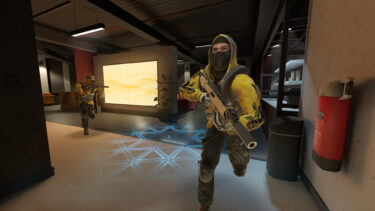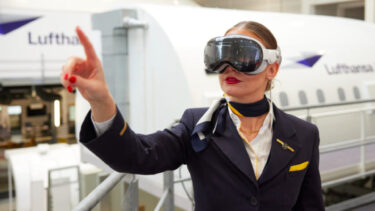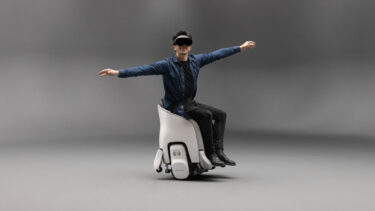If a passenger on an aircraft becomes agitated or even aggressive, the most important thing for the cabin crew is to remain calm and composed themselves and defuse the tense situation. Lufthansa Aviation Training (LAT) recently started using virtual reality to train this. The app for this was created using a modular system without any programming knowledge.
An article by Jörn Schumacher
German-based studio 3spin Learning has developed a drag-and-drop solution that allows anyone to create their own VR apps. The developers call it a web-based “no-code editor”. The advantage: customers no longer have to program code themselves or hire developers to do so. Instead, they can create a VR environment in a browser using a ready-made set of tools and objects, customize it at any time, and make it available to training participants.
“Every passenger reacts differently in difficult situations. That’s why we need variety and a lot of practice in our training courses,” says Saskia Foysi, Product Manager Digital Learning at Lufthansa Aviation Training, during a demo presentation. Will someone become aggressive or anxious? Different passenger behaviors can be simulated. Artificial intelligence supports the app so that the behaviors are more varied and remain surprising.
The benefits are numerous: The variety of passenger types that can be quickly called up increases the efficiency of the training. There are lower costs for trainers and no travel costs for participants. Users can learn together as a team, represented by avatars in VR. Trainers can directly observe and evaluate participants’ behavior. For training, any classroom becomes a virtual aircraft cabin.
Trainers remain accessible despite the virtual environment
In 3spin Learning’s browser-based no-code editor, users simply drag and drop pre-built building blocks to create an application. Be it a 360-degree environment, videos, or VR and AR. Users can add images, video or audio files, as well as 3D models they have created or purchased. Objects are then assigned “triggers,” or interactions, such as clicking or touching.
Users can also be added to log into the finished system. “Our customers say it’s as easy as creating a PowerPoint presentation,” says Thomas Hoger, who co-founded the company with Oliver Göck in 2020. The principle of “learning by doing” has been around for thousands of years, says Hoger, so it makes sense to extend this most effective form of learning to the digital world.

With the Lufthansa Aviation Training app, Hoger notes that all users have “embraced” the AR app for Apple Vision Pro. “They appreciate the fact that they can use augmented reality to immerse themselves in a different environment without losing touch with the real people around them,” says Hoger. “They especially like the fact that they can still talk to the trainers at the same time.”
Apple’s VR/AR headset won him over because of its ability to “seamlessly overlay reality with digital content and provide an immersive learning experience.” The company founder still sees a lot of potential: “There is still a wealth of ideas and scenarios that can be developed.” The Lufthansa flight training app is currently in the test and evaluation phase.
Lufthansa, BASF, Pfizer — a prominent customer base
3spin Learning has been working with Lufthansa for several years. During the warehouse expansion of the Lufthansa Cargo division, the average failure rate of the warehouse workers was reduced by 80 percent with the help of AR training. In addition to Lufthansa, customers include BASF, ERGO Insurance, DEKRA, and universities such as the University of Wuppertal and the University of Marburg.
Pfizer, a pharmaceutical and biotechnology company, uses VR simulations from 3spin Learning for medical training and has reduced treatment times for stroke patients. The E.ON network operator Avacon used the virtual reality platform of 3spin Learning” to prepare more than 200 trainees at six locations for their daily work and to reduce travel costs.
Thomas Hoger and Oliver Göck met at university in 2004 and developed the first mobile VR pilot training for Lufthansa in 2014. In 2020, they founded the company “3spin Learning”, which now employs 20 people. Hoger was also a lecturer at Darmstadt University of Applied Sciences for more than ten years and created the world’s first university course on “Creating Virtual Reality Learning Experiences”.
For Hoger, one thing is clear: “People have always learned primarily through touch. The potential for learning with augmented reality headsets is far from exhausted. The next logical step is to make it as easy as possible to create applications with building blocks that can be assembled without any programming knowledge.
Source: Mixed News





